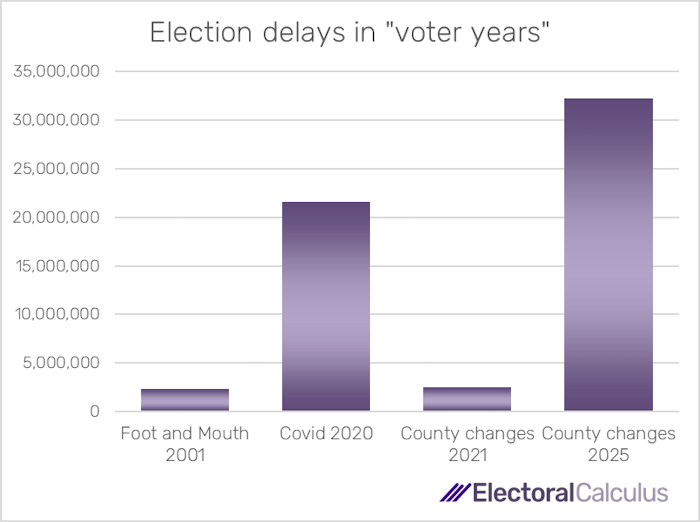Local elections are scheduled to take place this year on Thursday 1 May 2025.
But many of these elections might not go ahead. The government has plans to re-organise local government by merging together existing councils to create a smaller number of bigger councils. Existing councils have been invited to think about this, and to request delays to their upcoming elections, to allow for the re-organisation.
Instead of elections in May 2025, the following schedule seems likely to be followed for those councils who will be re-organised:
In effect, this means that the existing councillors would have three extra years in office, before new elected councillors appear, and without the voters having a say. There would be a three-year delay to democracy.
This would be the largest delay to democracy in decades, even larger than the delay due to the Covid public health emergency in 2020. The chart shows four recent democratic delays, measured in "voter years" – the delay in years multiplied by the number of voters affected.

Here, a voter year represents one voter having their vote delayed by one year. This current proposal affects 11 million voters, and imposes a three-year democratic delay, which we have quantified as 32.2 million voter years.
By comparison, the Covid public health emergency resulted in a one-year delay to elections affecting 21.6 million voters, which is equivalent to 21.6 million voter years.
The Labour government correctly point out that this delay is not novel, as the previous Conservative government created similar democratic delays when reorganising three counties (North Yorkshire, Somerset and Cumbria) in 2021. But that was on a much smaller scale: only 1.3 million voters were affected and the delay was only two years (one year of election delay, plus one year of shadow council), making 2.5 million voter years in total.
The earlier Foot and Mouth veterinary emergency in 2001 caused a delay affecting 24.4 million people, but only for one month, which is only 2.3 million voter years.
So far, the following eighteen councils have decided to ask for a delay in their own elections:
|
|
We note that the existing councillors were elected in 2021 when both the Conservative and Labour parties were more popular than they are now. It would be expected that many of these existing councillors could lose their seats to Reform UK, the Liberal Democrats or the Green party.
Instead, these same councillors have voted for a three-year extension to their term of office, without consulting the voters. That does not seem to give due respect to democracy.
The next table shows council were elections are likely to take place in May 2025, as scheduled. These councils make up less than half (by electorate) of those councils where elections were originally due to take place.
|
|
Alternatively, the government could decide to deny the requests from those eighteen Councils and let the 2025 elections go ahead in full. Some councillors would then serve for only three years instead of four, if their council is re-organised, and voters would have to go to the polls again to elect the new council later.
But more voting is probably more democratic than less voting in this case. And it would also protect the government from the complaints of other parties that they are denying voters' right to be heard.
The government announced delays to elections in nine local authorities: Essex, Hampshire, Surrey, Norfolk, West Sussex, Suffolk, East Sussex, Thurrock, Isle of Wight.
These have a total electorate of 5.6 million voters, which translates into a democratic delay of 16.4 million voter years. That is still much larger than the county change delays in 2021, and similar in scale to the delay caused by the Covid public health emergency.